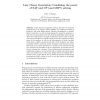1144 search results - page 35 / 229 » Logic programming for combinatorial problems |
110
Voted
LPNMR
1999
Springer
15 years 6 months ago
1999
Springer
We introduce choice logic programs as negation-free datalog programs that allow rules to have exclusive-only (possibly empty) disjunctions in the head. Such programs naturally mod...
105
click to vote
KR
1994
Springer
15 years 6 months ago
1994
Springer
In this paper we describe REVISE, an extended logic programming system for revising knowledge bases. REVISE is based on logic programming with explicit negation, plus a two-valued...
178
click to vote
CPAIOR
2010
Springer
15 years 10 days ago
2010
Springer
Finite domain propagation solving, the basis of constraint programming (CP) solvers, allows building very high-level models of problems, and using highly specific inference encapsu...
131
click to vote
EUROCAST
1994
Springer
15 years 6 months ago
1994
Springer
Logistic systems analysts use a wide array of modeling systems such as algebraic and logic programs. Two simple examples show how they mesh as Constraint Logic programs, emphasizin...
136
click to vote
CPAIOR
2008
Springer
15 years 4 months ago
2008
Springer
Theoretical models for the evaluation of quickly improving search strategies, like limited discrepancy search, are based on specific assumptions regarding the probability that a va...

